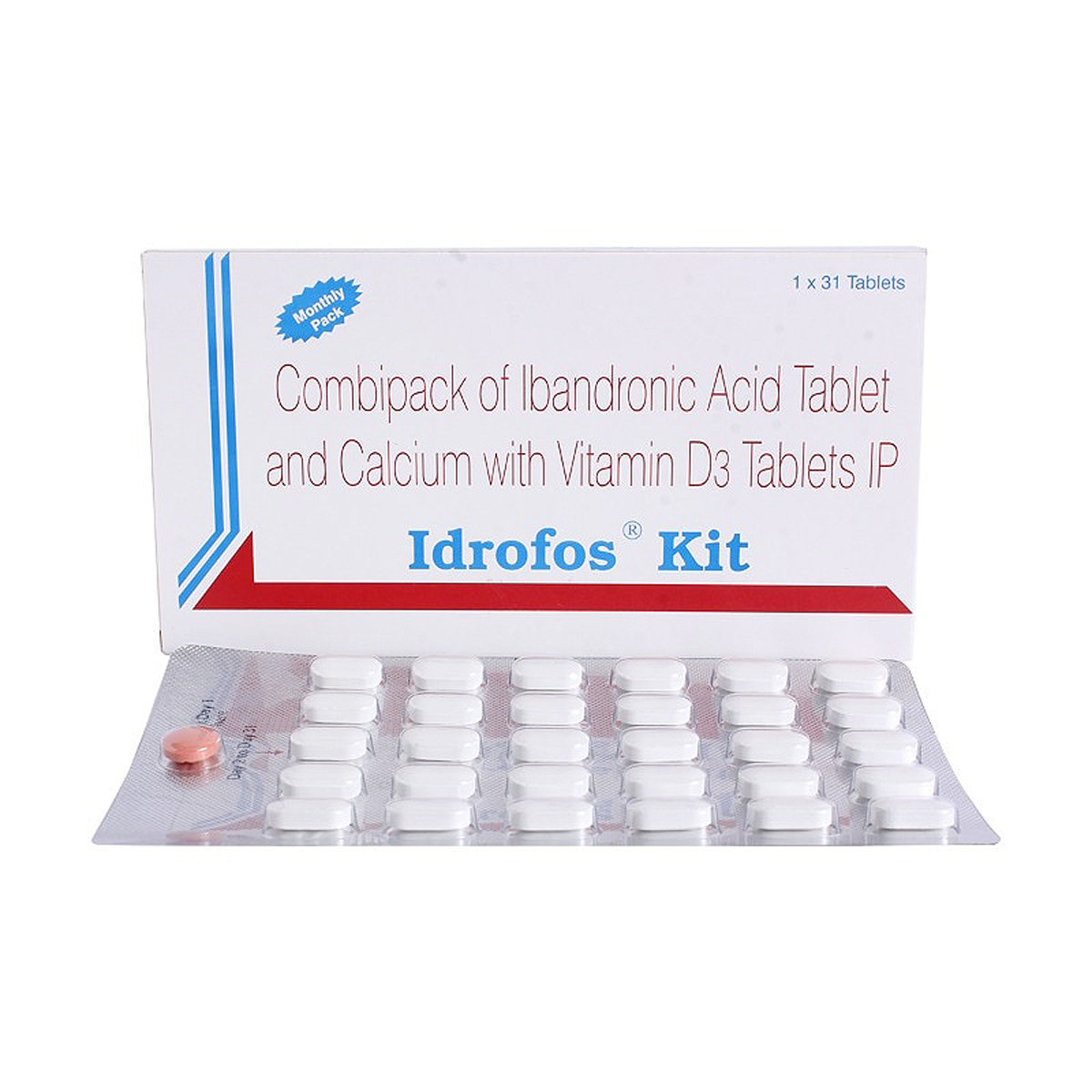Ibandronic Acid+calcium+cholecalciferol
About Ibandronic Acid+calcium+cholecalciferol
Ibandronic Acid+calcium+cholecalciferol belongs to a group of medications called 'antiosteoporotic medications used to prevent and treat age-related elderly osteoporosis and postmenopausal osteoporosis in women (after menopause). Ibandronic Acid+calcium+cholecalciferol helps to reduce the risk of spine and hip fractures. Osteoporosis is a medical condition in which bone becomes thin or weak. When a woman reaches her menopause stages, her ovaries stop making the female hormone (estrogen) responsible for maintaining a woman's bone health. Due to the loss of estrogen, bone loss starts, and bones become weak. The earlier a woman reaches menopause, the more the chances of osteoporosis. If proper treatment is not provided, it can even result in brittle bones, increasing bone fracture risk.
Ibandronic Acid+calcium+cholecalciferol consists of three medicines: Ibandronic acid (bisphosphonates), Calcium (mineral) and Cholecalciferol (Vitamin D3). Ibandronic acid is a bisphosphonate that prevents bone fracture by slowing bone loss, keeping the bones strong and increasing bone thickness. It also helps rebuild bones, reducing the risk of spine and hip fractures. Calcium is a mineral used to prevent or treat a calcium deficiency. It provides essential nutrients to maintain bone formation and maintenance. Cholecalciferol is a steroid hormone produced in the skin when exposed to ultraviolet light or obtained from food sources. It helps maintain blood calcium and phosphorus levels and mineralization of bone.
Your doctor will advise you how often you need to take Ibandronic Acid+calcium+cholecalciferol based on your medical condition. Ibandronic Acid+calcium+cholecalciferol may cause undesirable effects like stomach pain, heartburn, difficulty swallowing, or pain upon swallowing. Most of these side effects of Ibandronic Acid+calcium+cholecalciferol do not require medical attention and gradually resolve over time. However, if the side effects persist or worsen, stop taking Ibandronic Acid+calcium+cholecalciferol and consult your doctor.
If you are known to be allergic to Ibandronic Acid+calcium+cholecalciferol or its inactive components, please inform your doctor. Pregnant or breastfeeding women should consult their doctor before taking Ibandronic Acid+calcium+cholecalciferol. Higher doses of Vitamin D than the recommended daily dose should be used in pregnant women only when advised by the doctor. Ibandronic Acid+calcium+cholecalciferol passes into the breast milk; hence breastfeeding mothers need medical advice before starting Ibandronic Acid+calcium+cholecalciferol. Ibandronic Acid+calcium+cholecalciferol should not be given to children or adolescents whose age is less than 18 years.
Uses of Ibandronic Acid+calcium+cholecalciferol
Medicinal Benefits
Ibandronic Acid+calcium+cholecalciferol consists of three medicines, namely, Ibandronic acid (bisphosphonates), Calcium (mineral), and Cholecalciferol (Vitamin D3). Ibandronic acid is a bisphosphonate that helps maintain strong bones and reduces fracture chances. It also increases bone thickness and rebuilds bones, reducing the risk of spine and hip fractures. It is also indicated for the treatment of increasing bone mass in men with osteoporosis, glucocorticoid-induced osteoporosis and Paget's disease of bone. Calcium is a mineral used to prevent or treat a calcium deficiency. It provides essential nutrients to maintain bone formation and maintenance. Cholecalciferol is a steroid hormone produced in the skin when exposed to ultraviolet light or obtained from food sources. It is a provitamin that is converted into a vitamin after intake. Cholecalciferol is a form of Vitamin D and helps maintain blood calcium and phosphorus levels and bone mineralisation. It treats and prevents bone disorders, such as rickets and osteomalacia. Together, Ibandronic Acid+calcium+cholecalciferol is used to treat low blood calcium levels. It effectively treats conditions caused by low calcium levels in the body like Vitamin D deficiency, osteoporosis in postmenopausal women and the elderly (above 65 years of age), hypoparathyroidism, latent tetany, and rickets or osteomalacia.
Directions for Use
Storage
Side Effects of Ibandronic Acid+calcium+cholecalciferol
- Constipation
- Stomach upset
- Heartburn
- Stomach pain
- Pain upon swallowing
- Joint pain
Drug Warnings
Do not take Ibandronic Acid+calcium+cholecalciferol if you are allergic to Ibandronic Acid+calcium+cholecalciferol or its inactive components. Pregnant ladies should first consult with their doctor before taking Ibandronic Acid+calcium+cholecalciferol as it is not known whether this medicine will harm an unborn baby. Breastfeeding women should first consult with the doctor before taking Ibandronic Acid+calcium+cholecalciferol as it passes into breast milk and may affect the infant. Ibandronic Acid+calcium+cholecalciferol is not recommended if you have hypercalcaemia (high calcium levels), hypervitaminosis D (high vitamin D levels), have problems in the oesophagus (food pipe) and malabsorption syndrome (difficulty absorbing nutrition from food). After taking this medicine, a person should sit upright or stand for at least half an hour, Ibandronic acid in Ibandronic Acid+calcium+cholecalciferol can cause serious stomach or oesophagus problems. Ibandronic Acid+calcium+cholecalciferol can increase the risk of jaw bone problems (osteonecrosis), especially in those treated with steroids, chemotherapy, radiation, cancer, blood cell disorders, and pre-existing dental problems. Brief your medical history if you have any heart/kidney/liver/blood vessel diseases, kidney stones, sarcoidosis (growth of inflammatory cells in different parts of the body), Crohn's disease (inflammatory bowel disease), Whipple's disease (bacterial infection affecting joints and digestive system), achlorhydria (little or no stomach acid), low levels of bile, and phosphate imbalance. Ibandronic Acid+calcium+cholecalciferol is only an only part of a complete program that includes diet modification, regular exercise, bone mineral density testing, and consuming calcium and vitamin supplements. Drinking alcohol can affect calcium absorption, therefore, it is advised to limit the alcohol intake while using Ibandronic Acid+calcium+cholecalciferol.
Drug Interactions
Drug-Drug Interactions: Ibandronic Acid+calcium+cholecalciferol may interact with drugs treating high cholesterol levels (cholestyramine, colesevelam, colestipol), antibiotics (doxycycline, minocycline, ciprofloxacin, levofloxacin, penicillin, neomycin, and chloramphenicol), anti-cancer drugs (estramustine), drugs treating bone loss (alendronate), thyroid hormone (levothyroxine), weight-loss drugs (orlistat), fits medicines (phenobarbital), mineral oils (paraffin), water pills (furosemide, ethacrynic acid), and heart-related medicines (digitoxin), Nonsteroidal Anti-Inflammatory Drugs (aspirin, naproxen, diclofenac).
Drug-Food Interactions: Ibandronic Acid+calcium+cholecalciferol may interact with caffeine-containing beverages like coffee, tea, or juice as it may decrease the absorption of Ibandronic Acid+calcium+cholecalciferol.
Drug-Disease Interactions: Ibandronic Acid+calcium+cholecalciferol is contraindicated in hypercalcaemia, hypervitaminosis D, malabsorption syndrome, Vitamin D toxicity, heart/kidney/liver/blood vessel diseases, kidney stones, sarcoidosis, Crohn's disease, Whipple's disease, achlorhydria, low levels of bile, phosphate imbalance, diabetes, and phenylketonuria, patients dealing with aspiration, ONJ (osteonecrosis of the jaw), hypocalcemia, upper gastrointestinal irritation, cardiovascular (heart) disease, kidney problems, and asthma.
Drug-Drug Interactions Checker List:
Safety Advice

Alcohol
cautionA person should limit the consumption of alcohol as it can increase the risk of stomach side effects from Ibandronic Acid+calcium+cholecalciferol. Talk to the doctor they will check the stomach problems.

Pregnancy
unsafeIbandronic Acid+calcium+cholecalciferol should be used by women who are at the postmenopausal stage but not by women who are pregnant or planning to be pregnant.

Breast Feeding
unsafeIbandronic Acid+calcium+cholecalciferol can pass directly in breast milk and harm the nursing baby, so do not take Ibandronic Acid+calcium+cholecalciferol while breastfeeding.

Driving
safe if prescribedIbandronic Acid+calcium+cholecalciferol does not influence a person's ability to drive so one can drive safely.

Liver
cautionLet your doctor know if you have any history of liver diseases before taking Ibandronic Acid+calcium+cholecalciferol. Hepatic impairment/liver disease can alter the metabolic and therapeutic activity of certain Vitamin D forms.

Kidney
cautionIt is advised to seek doctor advice before starting Ibandronic Acid+calcium+cholecalciferol if you have kidney diseases like kidney stones or undergoing dialysis. Caution should be taken in patients undergoing dialysis to maintain adequate phosphorus levels and avoid ectopic calcification (calcium deposition).

Children
consult your doctorIbandronic Acid+calcium+cholecalciferol should not be given to children or adolescents whose age is less than 18 years.
Habit Forming
Diet & Lifestyle Advise
- A person should consume calcium and vitamin D in their diet as it helps make stronger bones and avoid everyday osteoporosis dangers.
- A post-menopausal woman should limit salt intake as it can pose a high risk of losing more bone minerals than other women of the same age.
- Do regular exercise like weight-bearing exercises which are important for maintaining bone health.
- Calcium is important for making bones strong. Vitamin D is equally important, which helps to ensure absorption and retention of calcium in bones, so take food high in calcium and vitamins.
Special Advise
- Certain diagnostic test like bone density scan should be done regularly to check bone mineral density (BMD) while using Ibandronic Acid+calcium+cholecalciferol.
- Intake of Ibandronic Acid+calcium+cholecalciferol can cause false test result of bone imaging, so if you are taking Ibandronic Acid+calcium+cholecalciferol, let your doctor know before any bone test.
- Ibandronic Acid+calcium+cholecalciferol may interfere with cholesterol tests, hence please inform your doctor and laboratory staff that you are taking Ibandronic Acid+calcium+cholecalciferol before undergoing blood tests.
- Clinical monitoring of serum electrolyte concentrations and cardiac function is recommended.
Patients Concern
Disease/Condition Glossary
Osteoporosis: It is a medical condition that causes thinning and weakening of the bones. It usually happens in women after menopause and the elderly (men and women above 65 years of age). When a woman reaches her menopause stage, her ovaries stop making the estrogen, a female hormone responsible for keeping a woman’s bone health. Due to a lack of estrogen, the bone starts becoming weaker due to bone loss. The early a woman reaches the menopause stage, the greater the chances of osteoporosis. In starting days, osteoporosis does not show any symptoms. However, if proper treatment is not provided, then it can even lead to broken bones. Initially, the bones don't hurt, and breaks in the spine's bones may go unseen until they cause height loss. In Osteoporosis, bones there is a risk of bone fracture anytime during daily activities like lifting or even minor activities. Bones usually occur at the hip, spine, or wrist, leading to stooped posture (dowager’s hump) and loss of movement.
Vitamin D deficiency: When a person cannot get enough Vitamin D through food and exposure to sunlight, it leads to vitamin D deficiency. It often leads to thin, brittle or misshapen bones.
FAQs
Ibandronic Acid+calcium+cholecalciferol contains Ibandronic Acid, Calcium and Cholecalciferol. Ibandronic Acid belongs to a category of bisphosphonates that help prevent bone breakdown by slowing bone loss. This helps keep the bones strong and increases the thickness of bone and reduces the risk of broken bones (fractures). Calcium is a mineral and prevents or treats calcium deficiency. Cholecalciferol, also known as Vitamin D3, helps maintain blood calcium and phosphorus levels and bone mineralisation.
Ibandronic Acid+calcium+cholecalciferol may increase the risk of jaw bone problems (osteonecrosis) especially in persons with pre-existing dental problems, or people treated with steroids, cancer, blood cell disorders, chemotherapy or radiation
Persons whose age is more than 35 years have low estrogen levels, female reaching menopause, too much consumption of alcohol, tobacco, or caffeine, and lack of calcium and vitamin D in the foods are some of the factors that can increase the risk of osteoporosis.
Ibandronic Acid+calcium+cholecalciferol is used to increase low levels of calcium in the body. Hence it is not advised to use Ibandronic Acid+calcium+cholecalciferol during hypercalcaemia, since it causes the overdose of calcium leading to kidney stones and other effects.
A person should limit or quit smoking as it can reduce bone mineral density and increases the risks of fractures.






